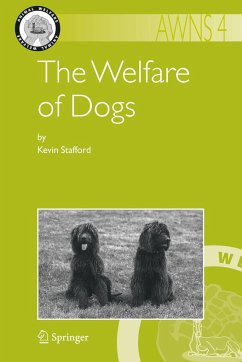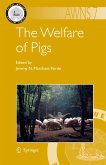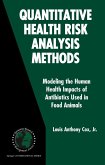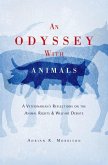This book discusses the welfare of dogs. It is the first book to focus entirely on dog welfare and its outlook on the subject is positive. The book has an international perspective on dog welfare in developed and under-developed countries.
Animal welfare is attracting increasing interest worldwide, but particularly from those in developed countries, who now have the knowledge and resources to be able to offer the best management systems for their farm animals, as well as potentially being able to offer plentiful resources for companion, zoo and laboratory animals. The increased attention given to farm animal welfare in the West derives largely from the fact that the relentless pursuit of financial reward and efficiency has led to the development of intensive animal production systems, that challenge the conscience of many consumers in those countries. In developing countries human survival is still a daily uncertainty, so that provision for animal welfare has to be balanced against human welfare. Welfare is usually provided for only if it supports the output of the animal, be it food, work, clothing, sport or companionship. In reality, there are resources for all if they are properly husbanded in both developing and developed countries. The inequitable division of the world's riches creates physical and psychological poverty for humans and animals alike in all sectors of the world. Livestock are the world's biggest land user (FAO, 2002) and the population is increasing rapidly to meet the need of an expanding human population. Populations of farm animals managed by humans are therefore increasing worldwide, and there is the tendency to allocate fewer resources to each animal. Increased attention to welfare issues is just as evident for companion, laboratory, wild and zoo animals.
Animal welfare is attracting increasing interest worldwide, but particularly from those in developed countries, who now have the knowledge and resources to be able to offer the best management systems for their farm animals, as well as potentially being able to offer plentiful resources for companion, zoo and laboratory animals. The increased attention given to farm animal welfare in the West derives largely from the fact that the relentless pursuit of financial reward and efficiency has led to the development of intensive animal production systems, that challenge the conscience of many consumers in those countries. In developing countries human survival is still a daily uncertainty, so that provision for animal welfare has to be balanced against human welfare. Welfare is usually provided for only if it supports the output of the animal, be it food, work, clothing, sport or companionship. In reality, there are resources for all if they are properly husbanded in both developing and developed countries. The inequitable division of the world's riches creates physical and psychological poverty for humans and animals alike in all sectors of the world. Livestock are the world's biggest land user (FAO, 2002) and the population is increasing rapidly to meet the need of an expanding human population. Populations of farm animals managed by humans are therefore increasing worldwide, and there is the tendency to allocate fewer resources to each animal. Increased attention to welfare issues is just as evident for companion, laboratory, wild and zoo animals.








